Assessment Task 1: Knowledge Questions about Organisation Development
Added on 2023-04-22
46 Pages22842 Words447 Views
Assessment Tool
Qualification BSB61218 Advanced Diploma of Program Management
Cluster number and name: PMAD 1.2 Contribute to organisation development
Units of competency: BSBMGT615 Contribute to organisation development
Student’s ID:
Assessor’s name:
Number of weeks Two (2) and a half weeks plus 2 weeks to submit completed assignment
ASSESSMENT INSTRUCTIONS
Overview
Prior to commencing the assessments your assessor will explain each task and the terms and submission of
your task. Please consult your assessor if you are unsure of any questions. It is important that you understand
adhere to the terms and conditions and address each task. If any task I not fully address than your assessment
task will not be marked. The assessor will support you throughout this process.
Written work
The assessment tasks are used to measure your understanding and underpinning skills and knowledge of this
unit of competency. When answering please ensure you address each criteria and sub point, demonstrate your
research of each of the questions and cover the topic in a logical and structured manner.
Active participation
It is a condition of enrolment that you actively participate in your studies. Active participation is completing all
tasks on time. If you do not participate you will be required to report to Student Services Coordinator.
Plagiarism
Plagiarism is taking and using someone else's thoughts, writings or inventions and representing them as your
own. Plagiarism is a serious act and may result in a student’s exclusion from a course. When you have any
doubts about including the work of other authors in your assessment, please consult your trainer/assessor. The
following list outlines some of the activities for which a student can be accused of plagiarism:
Presenting any work by another individual as one's own unintentionally
Handing in assessments markedly similar to or copied from another student
Presenting the work of another individual or group as their own work
Handing in assessments without the adequate acknowledgement of sources used, including assessments
taken totally or in part from the Internet
If it is identified that you have plagiarised within your assessment task, then we will organise a meeting to
discuss this with you.
Copyright
You must be careful when copying the work of others. The owner of the material may take legal action against
you if the owner's copyright has been infringed. You are allowed to do a certain amount of copying for research
or study purposes. Generally, 10% or one chapter of a book is acceptable, where the participant is studying
with, or employed by, an educational institution.
Competency Outcomes
Each activity in this assessment tasks will be marked as either Satisfactory or Not Satisfactory.
If your work is marked as Not Satisfactory you will be provided with feedback from your assessor and then
given time to complete the task. Your assessor will provide you with a timeline in which you will be required to
PMAD_ BSBMGT615 Marking Guide Version 3 Issued
5/2/2019
Page 1 of 46
Qualification BSB61218 Advanced Diploma of Program Management
Cluster number and name: PMAD 1.2 Contribute to organisation development
Units of competency: BSBMGT615 Contribute to organisation development
Student’s ID:
Assessor’s name:
Number of weeks Two (2) and a half weeks plus 2 weeks to submit completed assignment
ASSESSMENT INSTRUCTIONS
Overview
Prior to commencing the assessments your assessor will explain each task and the terms and submission of
your task. Please consult your assessor if you are unsure of any questions. It is important that you understand
adhere to the terms and conditions and address each task. If any task I not fully address than your assessment
task will not be marked. The assessor will support you throughout this process.
Written work
The assessment tasks are used to measure your understanding and underpinning skills and knowledge of this
unit of competency. When answering please ensure you address each criteria and sub point, demonstrate your
research of each of the questions and cover the topic in a logical and structured manner.
Active participation
It is a condition of enrolment that you actively participate in your studies. Active participation is completing all
tasks on time. If you do not participate you will be required to report to Student Services Coordinator.
Plagiarism
Plagiarism is taking and using someone else's thoughts, writings or inventions and representing them as your
own. Plagiarism is a serious act and may result in a student’s exclusion from a course. When you have any
doubts about including the work of other authors in your assessment, please consult your trainer/assessor. The
following list outlines some of the activities for which a student can be accused of plagiarism:
Presenting any work by another individual as one's own unintentionally
Handing in assessments markedly similar to or copied from another student
Presenting the work of another individual or group as their own work
Handing in assessments without the adequate acknowledgement of sources used, including assessments
taken totally or in part from the Internet
If it is identified that you have plagiarised within your assessment task, then we will organise a meeting to
discuss this with you.
Copyright
You must be careful when copying the work of others. The owner of the material may take legal action against
you if the owner's copyright has been infringed. You are allowed to do a certain amount of copying for research
or study purposes. Generally, 10% or one chapter of a book is acceptable, where the participant is studying
with, or employed by, an educational institution.
Competency Outcomes
Each activity in this assessment tasks will be marked as either Satisfactory or Not Satisfactory.
If your work is marked as Not Satisfactory you will be provided with feedback from your assessor and then
given time to complete the task. Your assessor will provide you with a timeline in which you will be required to
PMAD_ BSBMGT615 Marking Guide Version 3 Issued
5/2/2019
Page 1 of 46
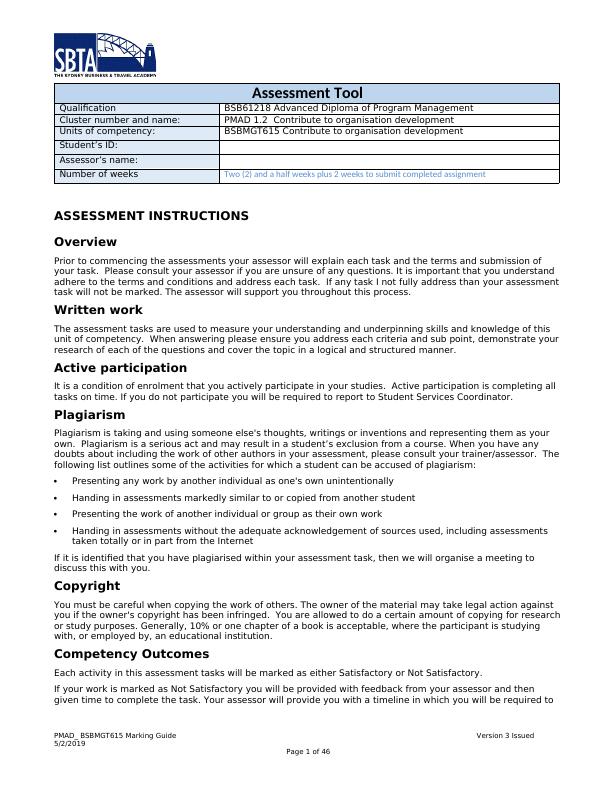
Assessment Tool
Qualification BSB61218 Advanced Diploma of Program Management
Cluster number and name: PMAD 1.2 Contribute to organisation development
Units of competency: BSBMGT615 Contribute to organisation development
Student’s ID:
Assessor’s name:
Number of weeks Two (2) and a half weeks plus 2 weeks to submit completed assignment
submit your task. Resubmission timeline will be determined by the assessor and based on the extent of the re-
submission.
When you have completed all tasks in this document you will be granted an overall competency outcome,
which will be either Competent or Not Yet Competent.
If your work is marked as Not Yet Competent you will be asked to resubmit the assessment tasks as indicated
by your assessor. You will not be able to gain competency if any of your tasks are not fully completed.
Assessment Appeals Process
If you are dissatisfied with the outcome of one of the assessment tasks or the final outcome of the assessment
task because you feel that the result is unfair or incorrect, you may request to have the task/s or overall
assessment task reviewed. If you are still dissatisfied with the outcome, you may lodge a formal assessment
appeal. Refer to SBTA’s Complaints/Appeals Policy and Procedure.
Application of the unit
This unit describes the skills required to perform market analysis, development and cost options, and justify for
a recommended business solution. This unit applies to those developing appropriate and cost-effective
business solutions. The skills and knowledge described in this unit must be applied within the legislative,
regulatory and policy environment in which they are carried out. Organisational policies and procedures must
be consulted and adhered to. Those undertaking this unit would work autonomously, performing complex tasks
in a range of familiar contexts.
Materials and learning resources supplied to you
All students who are studying the Program Management course are assigned and supplied the following
resources to assist them to learn and complete activities and assessments:
Unit Learner Guides
PowerPoint
Assessment Pack
Bounce Fitness website subscription to access workplace documentation. This is a virtual company from
which you can access organisational plans and other documents to be able to complete your project
activities in the assessment pack.
Zoho management software for projects and programs
ASSESSMENT SUBMISSION
Please note that this assessment task will be due on the on Monday 2 week of Term
2 / 2019 – please speak to your assessor if you require any additional information
on submission of this assessment pack.
PMAD_ BSBMGT615 Marking Guide Version 3 Issued
5/2/2019
Page 2 of 46
Qualification BSB61218 Advanced Diploma of Program Management
Cluster number and name: PMAD 1.2 Contribute to organisation development
Units of competency: BSBMGT615 Contribute to organisation development
Student’s ID:
Assessor’s name:
Number of weeks Two (2) and a half weeks plus 2 weeks to submit completed assignment
submit your task. Resubmission timeline will be determined by the assessor and based on the extent of the re-
submission.
When you have completed all tasks in this document you will be granted an overall competency outcome,
which will be either Competent or Not Yet Competent.
If your work is marked as Not Yet Competent you will be asked to resubmit the assessment tasks as indicated
by your assessor. You will not be able to gain competency if any of your tasks are not fully completed.
Assessment Appeals Process
If you are dissatisfied with the outcome of one of the assessment tasks or the final outcome of the assessment
task because you feel that the result is unfair or incorrect, you may request to have the task/s or overall
assessment task reviewed. If you are still dissatisfied with the outcome, you may lodge a formal assessment
appeal. Refer to SBTA’s Complaints/Appeals Policy and Procedure.
Application of the unit
This unit describes the skills required to perform market analysis, development and cost options, and justify for
a recommended business solution. This unit applies to those developing appropriate and cost-effective
business solutions. The skills and knowledge described in this unit must be applied within the legislative,
regulatory and policy environment in which they are carried out. Organisational policies and procedures must
be consulted and adhered to. Those undertaking this unit would work autonomously, performing complex tasks
in a range of familiar contexts.
Materials and learning resources supplied to you
All students who are studying the Program Management course are assigned and supplied the following
resources to assist them to learn and complete activities and assessments:
Unit Learner Guides
PowerPoint
Assessment Pack
Bounce Fitness website subscription to access workplace documentation. This is a virtual company from
which you can access organisational plans and other documents to be able to complete your project
activities in the assessment pack.
Zoho management software for projects and programs
ASSESSMENT SUBMISSION
Please note that this assessment task will be due on the on Monday 2 week of Term
2 / 2019 – please speak to your assessor if you require any additional information
on submission of this assessment pack.
PMAD_ BSBMGT615 Marking Guide Version 3 Issued
5/2/2019
Page 2 of 46
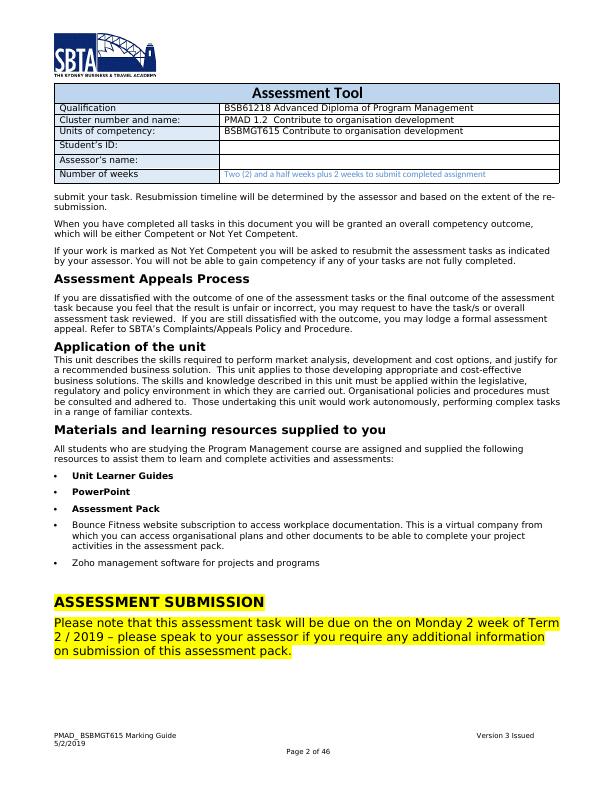
Assessment Tool
Qualification BSB61218 Advanced Diploma of Program Management
Cluster number and name: PMAD 1.2 Contribute to organisation development
Units of competency: BSBMGT615 Contribute to organisation development
Student’s ID:
Assessor’s name:
Number of weeks Two (2) and a half weeks plus 2 weeks to submit completed assignment
Assessment task 1:
PART 1A - Knowledge questions about organisation development
Assessment type:
Written answers to knowledge questions – PART 1A
Scenario and activities – PART 1B
Assessment task description
This is the first (1) assessment task which incorporates knowledge questions from both units of
competency.
The knowledge questions comprises of 5 knowledge questions.
You must respond to all questions and submit it to your assessor by the due date provided by
your assessor.
Your trainer will proivde you with feedabck for this task.
Resubmissions and reattempts
This clusgter of units is being delivered over a 5 week period. It is important that you submit
your work as directed by your tariner and assessor so that you can gain valualbe feedback
continously and throughout the course.
You will be able to resubmit your work after receiving feedback and if any of your answers have
been deemed not Satisfactory.
Your assessor will advise you of the due date for this taskk and provide you with timeline for your
resubmission.
It is important for you to understand that you are to submit this task for marking first pirior to
moving onto the next assessment task.
Reasonable adjustment
If you require any reasonable adjustment to complete your assessment, please contact the
trainer/assessor before completing any assessment task.
Please note academic standards of the unit will not be lowered to accommodate the needs of any
student but there is a requirement to be flexible about the way in which it is delivered and assessed.
Each case will be looked at on its own merit.
Location
Level 2, 401 Sussex Street, Sydney, NSW 2000 (Please look up the noticeboard for which room has
been allocated for your class on level 2).
PMAD_ BSBMGT615 Marking Guide Version 3 Issued
5/2/2019
Page 3 of 46
Qualification BSB61218 Advanced Diploma of Program Management
Cluster number and name: PMAD 1.2 Contribute to organisation development
Units of competency: BSBMGT615 Contribute to organisation development
Student’s ID:
Assessor’s name:
Number of weeks Two (2) and a half weeks plus 2 weeks to submit completed assignment
Assessment task 1:
PART 1A - Knowledge questions about organisation development
Assessment type:
Written answers to knowledge questions – PART 1A
Scenario and activities – PART 1B
Assessment task description
This is the first (1) assessment task which incorporates knowledge questions from both units of
competency.
The knowledge questions comprises of 5 knowledge questions.
You must respond to all questions and submit it to your assessor by the due date provided by
your assessor.
Your trainer will proivde you with feedabck for this task.
Resubmissions and reattempts
This clusgter of units is being delivered over a 5 week period. It is important that you submit
your work as directed by your tariner and assessor so that you can gain valualbe feedback
continously and throughout the course.
You will be able to resubmit your work after receiving feedback and if any of your answers have
been deemed not Satisfactory.
Your assessor will advise you of the due date for this taskk and provide you with timeline for your
resubmission.
It is important for you to understand that you are to submit this task for marking first pirior to
moving onto the next assessment task.
Reasonable adjustment
If you require any reasonable adjustment to complete your assessment, please contact the
trainer/assessor before completing any assessment task.
Please note academic standards of the unit will not be lowered to accommodate the needs of any
student but there is a requirement to be flexible about the way in which it is delivered and assessed.
Each case will be looked at on its own merit.
Location
Level 2, 401 Sussex Street, Sydney, NSW 2000 (Please look up the noticeboard for which room has
been allocated for your class on level 2).
PMAD_ BSBMGT615 Marking Guide Version 3 Issued
5/2/2019
Page 3 of 46
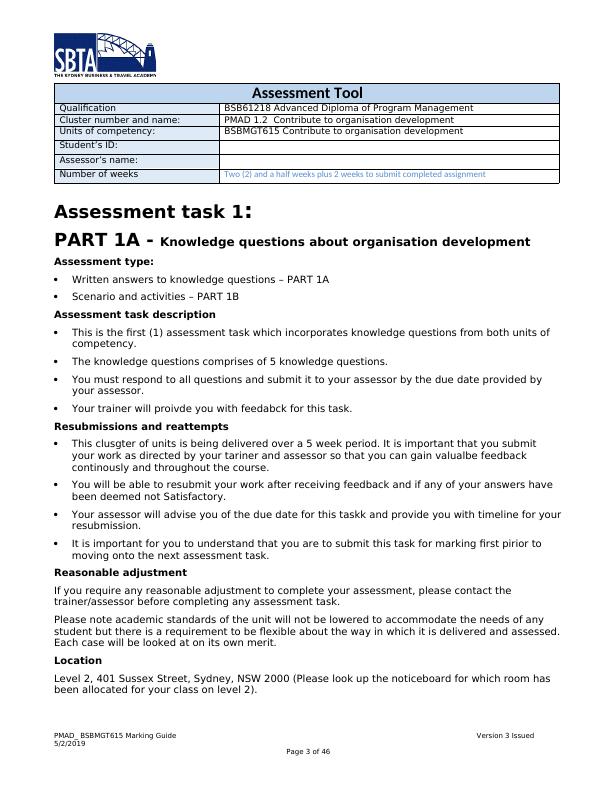
Assessment Tool
Qualification BSB61218 Advanced Diploma of Program Management
Cluster number and name: PMAD 1.2 Contribute to organisation development
Units of competency: BSBMGT615 Contribute to organisation development
Student’s ID:
Assessor’s name:
Number of weeks Two (2) and a half weeks plus 2 weeks to submit completed assignment
Purpose of the assessment task
The purpose of this assessment task is to assess your knowledge evidence in this unit competency
which means that you understand the following points and are able to:
explain how to maximise participation in and support for organisation development including
strategies or techniques for:
change management
consultation
evaluating the process and outcomes
generating ideas and options
managing conflict and resolving problems
outline theories of organisational behaviour and dynamics relevant to planning and implementing
organisational development
explain the impact of legislation on organisational development and change
list aspects of organisation culture that can affect organisation development and explain how to
address them in planning and implementation.
Instructions for answering written questions
It is expected that you correctly address each questions and follow the answering guidelines.
Answers must demonstrate an understanding and application of relevant concepts, critical
thinking, and good writing skills.
You must not use non-discriminatory language. The language used should not devalue, demean,
or exclude individuals or groups on the basis of attributes such as gender, disability, culture,
race, religion, sexual preference or age. Gender inclusive language should be used.
Answers must be in your own words and your own individual work.
Please note: If your trainer and assessor identifies that your work is copied or plagiarised, you
will be required to meet with the trainer and assessor, undergo an interview with Student
Services and discuss your submission and rectification requirements.
How your trainer/assessor will assess your work?
This assessment task requires you to answer all the questions.
Answers must demonstrate your understanding and knowledge of the units.
If all the questions have been answered correctly then you will receive a Satisfactory (S),
outcome. If any answer is marked incorrectly, then you will receive a Not Satisfactory (NS)
outcome for this task.
Resources and equipment required to complete this task
PMAD_ BSBMGT615 Marking Guide Version 3 Issued
5/2/2019
Page 4 of 46
Qualification BSB61218 Advanced Diploma of Program Management
Cluster number and name: PMAD 1.2 Contribute to organisation development
Units of competency: BSBMGT615 Contribute to organisation development
Student’s ID:
Assessor’s name:
Number of weeks Two (2) and a half weeks plus 2 weeks to submit completed assignment
Purpose of the assessment task
The purpose of this assessment task is to assess your knowledge evidence in this unit competency
which means that you understand the following points and are able to:
explain how to maximise participation in and support for organisation development including
strategies or techniques for:
change management
consultation
evaluating the process and outcomes
generating ideas and options
managing conflict and resolving problems
outline theories of organisational behaviour and dynamics relevant to planning and implementing
organisational development
explain the impact of legislation on organisational development and change
list aspects of organisation culture that can affect organisation development and explain how to
address them in planning and implementation.
Instructions for answering written questions
It is expected that you correctly address each questions and follow the answering guidelines.
Answers must demonstrate an understanding and application of relevant concepts, critical
thinking, and good writing skills.
You must not use non-discriminatory language. The language used should not devalue, demean,
or exclude individuals or groups on the basis of attributes such as gender, disability, culture,
race, religion, sexual preference or age. Gender inclusive language should be used.
Answers must be in your own words and your own individual work.
Please note: If your trainer and assessor identifies that your work is copied or plagiarised, you
will be required to meet with the trainer and assessor, undergo an interview with Student
Services and discuss your submission and rectification requirements.
How your trainer/assessor will assess your work?
This assessment task requires you to answer all the questions.
Answers must demonstrate your understanding and knowledge of the units.
If all the questions have been answered correctly then you will receive a Satisfactory (S),
outcome. If any answer is marked incorrectly, then you will receive a Not Satisfactory (NS)
outcome for this task.
Resources and equipment required to complete this task
PMAD_ BSBMGT615 Marking Guide Version 3 Issued
5/2/2019
Page 4 of 46
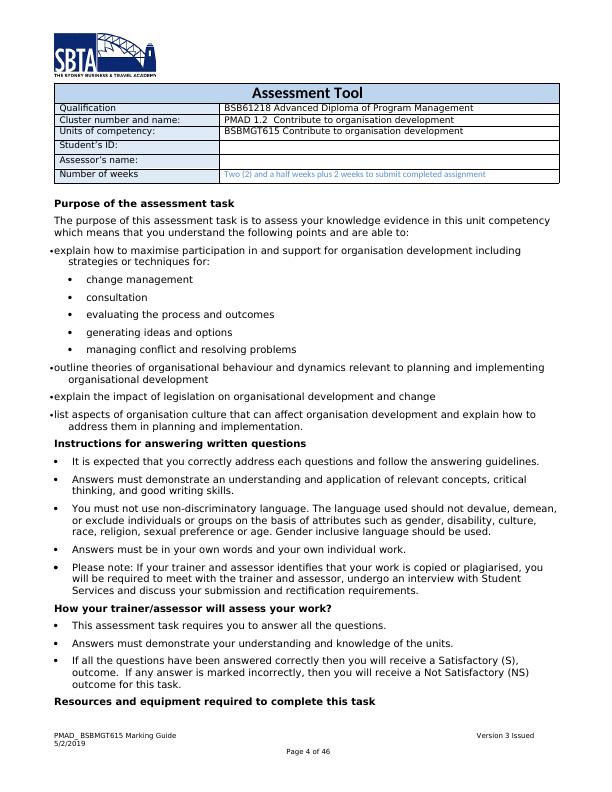
Assessment Tool
Qualification BSB61218 Advanced Diploma of Program Management
Cluster number and name: PMAD 1.2 Contribute to organisation development
Units of competency: BSBMGT615 Contribute to organisation development
Student’s ID:
Assessor’s name:
Number of weeks Two (2) and a half weeks plus 2 weeks to submit completed assignment
You will have access to the following:
Computer
Internet
Microsoft Office suite which will assist you with completing this assessment task
Printer
Student Portal
Learner guides for these two units of competency available electronically, this includes learner
guides from RTO Materials and Australian Training Products
Useful links and videos
Benchmark for Assessment
You are expected to respond to all questions. Direction is provided on the expected length
of your response. These assessments will require a Short, Medium or Long response.
The following is a guide to the expected number of words for each of these categories
unless otherwise indicated.
Short 30+ words
Medium 100+ words
Long 200+ words
Instructions to Students
In this assessment task you will be demonstrating the knowledge of organisation development that
ensures that the organisation will become more effective over time in achieving its goals. You will be
demonstrating your understanding how an organisation may need to adapt to new technologies,
challenges and markets to prosper. To provide a context for this assessment task case studies have
been prepared for you to review. Please speak to your assessor if you need to have clarification or
require more information about the context of the case studies.
By completing this assessment task you will be demonstrating that you understand about:
Organisational development plans
Implementing organisational developmental activities
Maintaining organisational developmental programs
At this level of study, the Advanced Diploma level, the assessment outcome should demonstrate
that you are able to research independently and produce good quality work. Individuals studying
Advanced Diploma must be able to demonstrate the following knowledge so that you are able to
understand and meet expectation:
PMAD_ BSBMGT615 Marking Guide Version 3 Issued
5/2/2019
Page 5 of 46
Qualification BSB61218 Advanced Diploma of Program Management
Cluster number and name: PMAD 1.2 Contribute to organisation development
Units of competency: BSBMGT615 Contribute to organisation development
Student’s ID:
Assessor’s name:
Number of weeks Two (2) and a half weeks plus 2 weeks to submit completed assignment
You will have access to the following:
Computer
Internet
Microsoft Office suite which will assist you with completing this assessment task
Printer
Student Portal
Learner guides for these two units of competency available electronically, this includes learner
guides from RTO Materials and Australian Training Products
Useful links and videos
Benchmark for Assessment
You are expected to respond to all questions. Direction is provided on the expected length
of your response. These assessments will require a Short, Medium or Long response.
The following is a guide to the expected number of words for each of these categories
unless otherwise indicated.
Short 30+ words
Medium 100+ words
Long 200+ words
Instructions to Students
In this assessment task you will be demonstrating the knowledge of organisation development that
ensures that the organisation will become more effective over time in achieving its goals. You will be
demonstrating your understanding how an organisation may need to adapt to new technologies,
challenges and markets to prosper. To provide a context for this assessment task case studies have
been prepared for you to review. Please speak to your assessor if you need to have clarification or
require more information about the context of the case studies.
By completing this assessment task you will be demonstrating that you understand about:
Organisational development plans
Implementing organisational developmental activities
Maintaining organisational developmental programs
At this level of study, the Advanced Diploma level, the assessment outcome should demonstrate
that you are able to research independently and produce good quality work. Individuals studying
Advanced Diploma must be able to demonstrate the following knowledge so that you are able to
understand and meet expectation:
PMAD_ BSBMGT615 Marking Guide Version 3 Issued
5/2/2019
Page 5 of 46
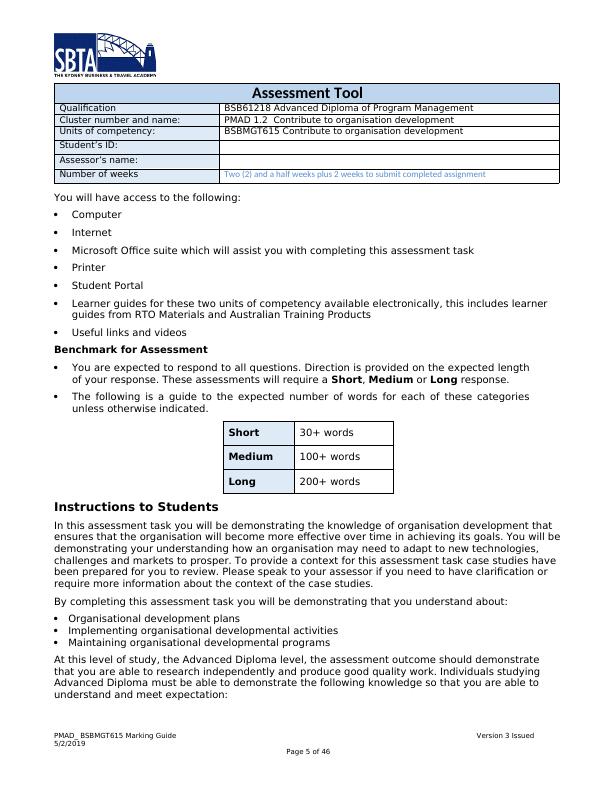
Assessment Tool
Qualification BSB61218 Advanced Diploma of Program Management
Cluster number and name: PMAD 1.2 Contribute to organisation development
Units of competency: BSBMGT615 Contribute to organisation development
Student’s ID:
Assessor’s name:
Number of weeks Two (2) and a half weeks plus 2 weeks to submit completed assignment
Answers to questions should be very detailed and report form type of answers and all answers
should be extensive.
Projecting activities are detailed and well-developed, suitable for senior management positions.
Designing research, conduct analysis and report on the outcomes are provide with good
suggestions and implementation process and ideas.
Developing strategies for the business and the organisation.
Activities
Read each question below and answer as directed.
Answer guide: This assessment task is to be typed. Each question has a guide for you to adhere to.
1.1. It is a good practice for organisations to give their employees opportunities to provide ideas to
management and to maximise their own participation and support the development and
growth of the organisation.
a. As a manager, explain how you would be able to contribute to organisational strategies and
improve the efficiency or services of an organisation that you work for. (guide: approximately 150
words)
It is one of the major responsibilities of a manager to contribute to organisational change as well as improve the
efficiency and services of an organisation. The manager is generally assigned to supervise and control
organisational performance through monitoring and guiding his subordinates who are the primary working
employees of the organisation. Since these employees are the highest contributors to the productivity of an
organisation, it is the role of the manager to enhance the performances and increase productivity of the company.
There are different approaches to achieving this goal that are used differently by different managers. Some
managers use tough guidance i.e. employees are strongly rebuked for poor performance and good performances
are generally ignored whereas some managers use much more employee-friendly approach and motivate the
employees on a constant basis. Whatever be the approach, the manager must ensure the organisational
productivity and operations are well aligned with the organisational strategies that are currently under use.
b. Review each of the following headings and explain how each is able to contribute to
organisational development and improvements in efficiency or services for the organisation.
(guide: approximately 500 words)
Heading Overview of what this is and
provide examples
Explain how these can help the
organisation
Change
management
Change management is defined as the
process by which some strategic changes
are implemented in the existing strategy or
structure to give it an entire new direction.
Change management is generally
implemented when it is seen that the
current strategic direction is not suitable for
the organisation and a suitable change can
really benefit the company in terms of
business and strategic plan.
Change management plays very
significant role in determining the
success of an organisation in terms of
internal and external operations and
business. Without any change
management, an organisation will
continue to move in a wrong duration
during a hard time and will ultimately
lead to the demise of the company.
However, change management is not an
abrupt process; rather it requires a lot of
planning, analysis and feasibility test
before implementing the same in the
organisation. Changes are generally
PMAD_ BSBMGT615 Marking Guide Version 3 Issued
5/2/2019
Page 6 of 46
Qualification BSB61218 Advanced Diploma of Program Management
Cluster number and name: PMAD 1.2 Contribute to organisation development
Units of competency: BSBMGT615 Contribute to organisation development
Student’s ID:
Assessor’s name:
Number of weeks Two (2) and a half weeks plus 2 weeks to submit completed assignment
Answers to questions should be very detailed and report form type of answers and all answers
should be extensive.
Projecting activities are detailed and well-developed, suitable for senior management positions.
Designing research, conduct analysis and report on the outcomes are provide with good
suggestions and implementation process and ideas.
Developing strategies for the business and the organisation.
Activities
Read each question below and answer as directed.
Answer guide: This assessment task is to be typed. Each question has a guide for you to adhere to.
1.1. It is a good practice for organisations to give their employees opportunities to provide ideas to
management and to maximise their own participation and support the development and
growth of the organisation.
a. As a manager, explain how you would be able to contribute to organisational strategies and
improve the efficiency or services of an organisation that you work for. (guide: approximately 150
words)
It is one of the major responsibilities of a manager to contribute to organisational change as well as improve the
efficiency and services of an organisation. The manager is generally assigned to supervise and control
organisational performance through monitoring and guiding his subordinates who are the primary working
employees of the organisation. Since these employees are the highest contributors to the productivity of an
organisation, it is the role of the manager to enhance the performances and increase productivity of the company.
There are different approaches to achieving this goal that are used differently by different managers. Some
managers use tough guidance i.e. employees are strongly rebuked for poor performance and good performances
are generally ignored whereas some managers use much more employee-friendly approach and motivate the
employees on a constant basis. Whatever be the approach, the manager must ensure the organisational
productivity and operations are well aligned with the organisational strategies that are currently under use.
b. Review each of the following headings and explain how each is able to contribute to
organisational development and improvements in efficiency or services for the organisation.
(guide: approximately 500 words)
Heading Overview of what this is and
provide examples
Explain how these can help the
organisation
Change
management
Change management is defined as the
process by which some strategic changes
are implemented in the existing strategy or
structure to give it an entire new direction.
Change management is generally
implemented when it is seen that the
current strategic direction is not suitable for
the organisation and a suitable change can
really benefit the company in terms of
business and strategic plan.
Change management plays very
significant role in determining the
success of an organisation in terms of
internal and external operations and
business. Without any change
management, an organisation will
continue to move in a wrong duration
during a hard time and will ultimately
lead to the demise of the company.
However, change management is not an
abrupt process; rather it requires a lot of
planning, analysis and feasibility test
before implementing the same in the
organisation. Changes are generally
PMAD_ BSBMGT615 Marking Guide Version 3 Issued
5/2/2019
Page 6 of 46
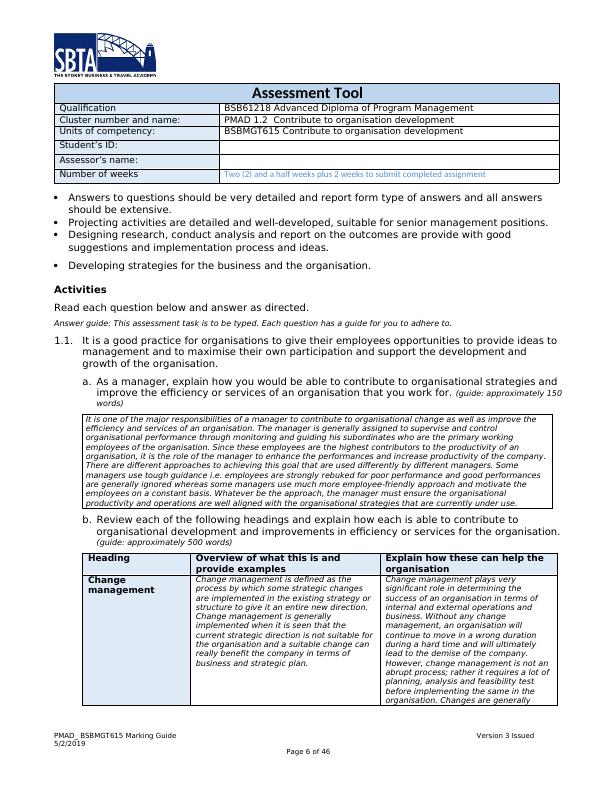
Assessment Tool
Qualification BSB61218 Advanced Diploma of Program Management
Cluster number and name: PMAD 1.2 Contribute to organisation development
Units of competency: BSBMGT615 Contribute to organisation development
Student’s ID:
Assessor’s name:
Number of weeks Two (2) and a half weeks plus 2 weeks to submit completed assignment
implement for a long term effect but
some changes are meant for some short
term impact on the organisation only.
Consultation Consultation is defined as the process by
which a strategic plan for a particular
organisation is developed after consulting
with a specific expert on that field of
strategy. For example, when a company
wants to deploy information technology but
do not have any clear idea about the same,
the project managers consult a specific IT
personnel or group (generally external)
while developing a suitable plan for the
project. The consultant helps to gain some
precise understanding on a particular field
that is mostly an unknown territory for the
organisation. Consultation is highly
recommended when the proposed project is
very critical for the organisation and it does
not have any specific expertise on the
same.
The benefits of consultation are realised
when the organisation does not sufficient
expertise or knowledge in the field of
project that they are interested in
executing. Due to the growing demands
of the modern day market, it is required
for the business organisations to update
themselves such as IT implementation,
CRM implementation, ERP
implementation and others. In most of
the cases, the business management
members do not have sufficient and
precise idea regarding how to implement
these systems within the organisational
strategy. Hence, one or more
consultants are hired who provide in-
depth insight and assist in the
development of a suitable project plan.
Generating ideas
and options
Generating ideas and options is an essential
part of a strategy planning for any
organisation. For this purpose, ideas and
options are generated by multiple personnel
instead of one through various processes
like meeting, survey, interview and others.
Generation of ideas and options for a
particular organisation depends on the
strategic direction as well as management
type in the same. While some organisations
opt for mostly management discretion only,
some other organisations emphasise
strongly on the ideas and options generated
by both management team members and
the other employees.
The main benefit of generating ideas and
options from different people is that a
variety of different opinions are
generated. As a result, the company can
explore new directions and dimensions
that were previously not thought of. If
the generation of ideas is limited to only
one or two personnel, the viewpoint on a
particular matter is limited and also
there are not much options for
alternative ideas that might be more
beneficial for the organisation than the
existing one.
1.2. Conduct a research of different theories for organisational behaviour and dynamics and list
them below. Then using the space below, select 2 from your research and discuss two (2)
theories of organisational behaviour and dynamics which are relevant to planning and
implementing organisational development and improvements. (guide: minimum of 100 words for each
theory)
Research of different
theories
Organisational behaviour is defined as the overall output of an organisation based
on behaviour of the employees within its internal operational settings. Various
theories related to organisational behaviour mainly focuses on the behaviour
shown by the employees within the internal settings of the organisation and also
the impact of the behaviour on the overall performance and output of the
company. Some of the common theories on organisational behaviour include
bureaucracy, institutional theory, systems theory and others. However, for this
particular assignment, only two theories namely bureaucracy and neoclassical
theory have been discussed.
Theory 1 explanation Bureaucracy – Bureaucracy theory describes the organisational behaviour that is
directed by set of specific rules and standards (especially legal). In this type of
organisational behaviour, the theory states that the employees of the organisation
PMAD_ BSBMGT615 Marking Guide Version 3 Issued
5/2/2019
Page 7 of 46
Qualification BSB61218 Advanced Diploma of Program Management
Cluster number and name: PMAD 1.2 Contribute to organisation development
Units of competency: BSBMGT615 Contribute to organisation development
Student’s ID:
Assessor’s name:
Number of weeks Two (2) and a half weeks plus 2 weeks to submit completed assignment
implement for a long term effect but
some changes are meant for some short
term impact on the organisation only.
Consultation Consultation is defined as the process by
which a strategic plan for a particular
organisation is developed after consulting
with a specific expert on that field of
strategy. For example, when a company
wants to deploy information technology but
do not have any clear idea about the same,
the project managers consult a specific IT
personnel or group (generally external)
while developing a suitable plan for the
project. The consultant helps to gain some
precise understanding on a particular field
that is mostly an unknown territory for the
organisation. Consultation is highly
recommended when the proposed project is
very critical for the organisation and it does
not have any specific expertise on the
same.
The benefits of consultation are realised
when the organisation does not sufficient
expertise or knowledge in the field of
project that they are interested in
executing. Due to the growing demands
of the modern day market, it is required
for the business organisations to update
themselves such as IT implementation,
CRM implementation, ERP
implementation and others. In most of
the cases, the business management
members do not have sufficient and
precise idea regarding how to implement
these systems within the organisational
strategy. Hence, one or more
consultants are hired who provide in-
depth insight and assist in the
development of a suitable project plan.
Generating ideas
and options
Generating ideas and options is an essential
part of a strategy planning for any
organisation. For this purpose, ideas and
options are generated by multiple personnel
instead of one through various processes
like meeting, survey, interview and others.
Generation of ideas and options for a
particular organisation depends on the
strategic direction as well as management
type in the same. While some organisations
opt for mostly management discretion only,
some other organisations emphasise
strongly on the ideas and options generated
by both management team members and
the other employees.
The main benefit of generating ideas and
options from different people is that a
variety of different opinions are
generated. As a result, the company can
explore new directions and dimensions
that were previously not thought of. If
the generation of ideas is limited to only
one or two personnel, the viewpoint on a
particular matter is limited and also
there are not much options for
alternative ideas that might be more
beneficial for the organisation than the
existing one.
1.2. Conduct a research of different theories for organisational behaviour and dynamics and list
them below. Then using the space below, select 2 from your research and discuss two (2)
theories of organisational behaviour and dynamics which are relevant to planning and
implementing organisational development and improvements. (guide: minimum of 100 words for each
theory)
Research of different
theories
Organisational behaviour is defined as the overall output of an organisation based
on behaviour of the employees within its internal operational settings. Various
theories related to organisational behaviour mainly focuses on the behaviour
shown by the employees within the internal settings of the organisation and also
the impact of the behaviour on the overall performance and output of the
company. Some of the common theories on organisational behaviour include
bureaucracy, institutional theory, systems theory and others. However, for this
particular assignment, only two theories namely bureaucracy and neoclassical
theory have been discussed.
Theory 1 explanation Bureaucracy – Bureaucracy theory describes the organisational behaviour that is
directed by set of specific rules and standards (especially legal). In this type of
organisational behaviour, the theory states that the employees of the organisation
PMAD_ BSBMGT615 Marking Guide Version 3 Issued
5/2/2019
Page 7 of 46
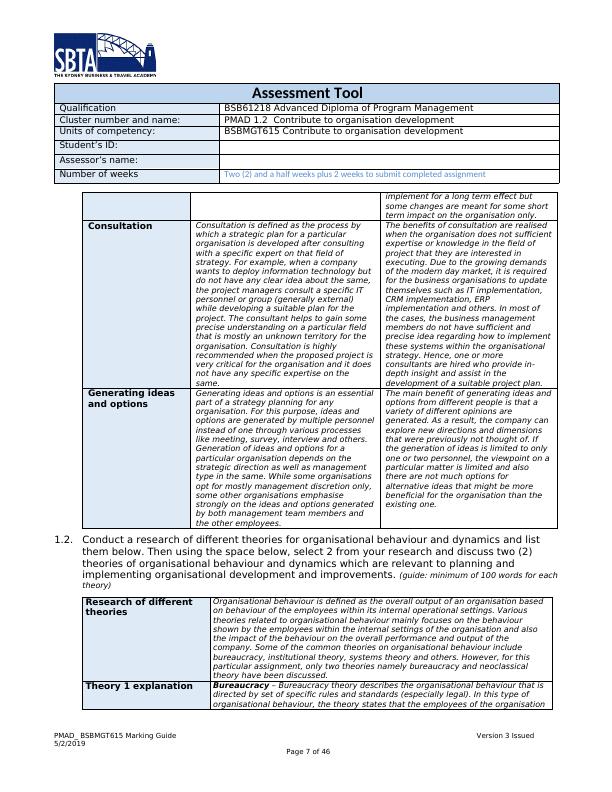
Assessment Tool
Qualification BSB61218 Advanced Diploma of Program Management
Cluster number and name: PMAD 1.2 Contribute to organisation development
Units of competency: BSBMGT615 Contribute to organisation development
Student’s ID:
Assessor’s name:
Number of weeks Two (2) and a half weeks plus 2 weeks to submit completed assignment
need to follow the standard and legal framework of behaviour that are being
instructed by the company. According to this theory, this approach of
organisational behaviour provides a very professional and standardised approach
that is expected from a business organisation. While this is widely accepted theory
in many organisations, some organisations provide flexibility in behavioural
requirements by deviating from the bureaucracy theory guidelines and this
approach does not require any specific framework or standard.
Theory 2 explanation NeoClassical Theory – Most of the organisations that do not follow bureaucracy
theory generally follow the neoclassical theory. The neoclassical theory is also
referred to as the human relations approach and emphasises on the personal
requirements and behavioural pattern of an individual rather than a specific
behavioural policy or framework. This particular theory allows different behavioural
strategies within one organisation depending on the person to be interacted with.
In other words, this theory focuses on a much more flexible and interactive
approach with the employees. However, due to the additional flexibility, the
behaviour often does not remain professional and technical and hence, many
organisations do not prefer this approach.
1.3. As a manager, when developing and improving an organisation and its practices and
operations, you must ensure that the organisation is compliant with relevant laws and
legislations. Read the following Case Study. Ensure that the legislations you will be researching
are relevant to the Case Study.
Case Study 1 – “Tasty Products”
Read the case study below and ensure you understand the case study well prior to attempting
to complete the question. Speak to your assessor if you require clarification about the case
study.
Case Study – Tasty Products
Roman Solomon is a manager at “Tasty Products PTY LTD” (Tasty Products). His responsibilities include
the management of a small project team who look after various projects for Tasty Products that result
in implementing new processes ensuring that Tasty Products is continuously improving its services and
staff work more effectively.
Last week Roman was invited to a meeting by the Director, Bill Compton, and Tasty Product’s Financial
Controller, Tomas Trumper. Bill wants to implement improvements into the organisation. He is
particularly keen to implement more environmental sustainable efficiency into the Tasty Products.
The meeting held discussions about the new Central Coast Council’s Environmental Sustainable
Solutions Project, which the Director, Bill Compton attended. Bill learnt that the Council has recently
approved a new environmental initiative project for Central Coast businesses in the aim to:
minimising the ecological footprint for the Central Coast area;
providing more work for local businesses;
improving the local economy.
Central Coast businesses who wish to participate must develop a good business case about their
environmentally sustainable project and present it to the Central Coast Council’s Environmental
Manager, Bethany Hopkins, who will evaluate each project and approve funding of the project.
If the project is successful and approved, Tasty Products can receive up to $10,000 financial
PMAD_ BSBMGT615 Marking Guide Version 3 Issued
5/2/2019
Page 8 of 46
Qualification BSB61218 Advanced Diploma of Program Management
Cluster number and name: PMAD 1.2 Contribute to organisation development
Units of competency: BSBMGT615 Contribute to organisation development
Student’s ID:
Assessor’s name:
Number of weeks Two (2) and a half weeks plus 2 weeks to submit completed assignment
need to follow the standard and legal framework of behaviour that are being
instructed by the company. According to this theory, this approach of
organisational behaviour provides a very professional and standardised approach
that is expected from a business organisation. While this is widely accepted theory
in many organisations, some organisations provide flexibility in behavioural
requirements by deviating from the bureaucracy theory guidelines and this
approach does not require any specific framework or standard.
Theory 2 explanation NeoClassical Theory – Most of the organisations that do not follow bureaucracy
theory generally follow the neoclassical theory. The neoclassical theory is also
referred to as the human relations approach and emphasises on the personal
requirements and behavioural pattern of an individual rather than a specific
behavioural policy or framework. This particular theory allows different behavioural
strategies within one organisation depending on the person to be interacted with.
In other words, this theory focuses on a much more flexible and interactive
approach with the employees. However, due to the additional flexibility, the
behaviour often does not remain professional and technical and hence, many
organisations do not prefer this approach.
1.3. As a manager, when developing and improving an organisation and its practices and
operations, you must ensure that the organisation is compliant with relevant laws and
legislations. Read the following Case Study. Ensure that the legislations you will be researching
are relevant to the Case Study.
Case Study 1 – “Tasty Products”
Read the case study below and ensure you understand the case study well prior to attempting
to complete the question. Speak to your assessor if you require clarification about the case
study.
Case Study – Tasty Products
Roman Solomon is a manager at “Tasty Products PTY LTD” (Tasty Products). His responsibilities include
the management of a small project team who look after various projects for Tasty Products that result
in implementing new processes ensuring that Tasty Products is continuously improving its services and
staff work more effectively.
Last week Roman was invited to a meeting by the Director, Bill Compton, and Tasty Product’s Financial
Controller, Tomas Trumper. Bill wants to implement improvements into the organisation. He is
particularly keen to implement more environmental sustainable efficiency into the Tasty Products.
The meeting held discussions about the new Central Coast Council’s Environmental Sustainable
Solutions Project, which the Director, Bill Compton attended. Bill learnt that the Council has recently
approved a new environmental initiative project for Central Coast businesses in the aim to:
minimising the ecological footprint for the Central Coast area;
providing more work for local businesses;
improving the local economy.
Central Coast businesses who wish to participate must develop a good business case about their
environmentally sustainable project and present it to the Central Coast Council’s Environmental
Manager, Bethany Hopkins, who will evaluate each project and approve funding of the project.
If the project is successful and approved, Tasty Products can receive up to $10,000 financial
PMAD_ BSBMGT615 Marking Guide Version 3 Issued
5/2/2019
Page 8 of 46
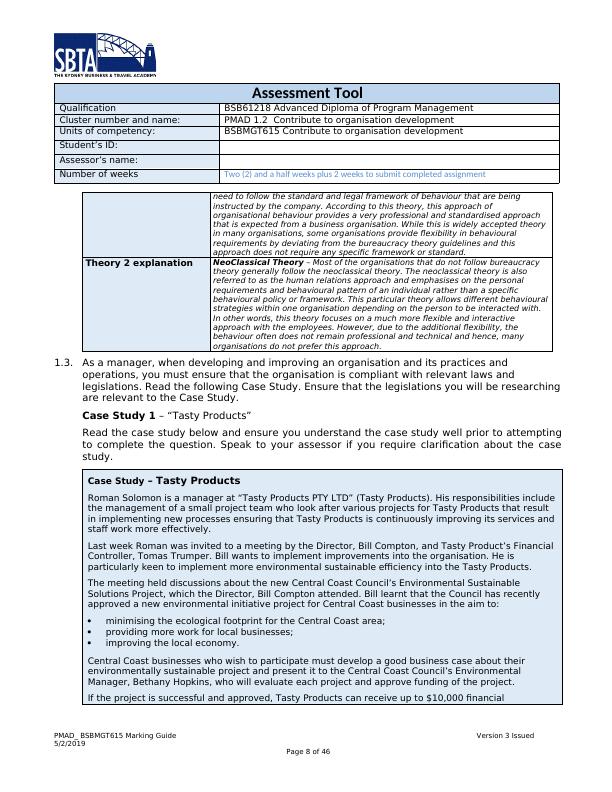
End of preview
Want to access all the pages? Upload your documents or become a member.
Related Documents
Advanced Diploma of Program Management Assignment PDFlg...
|41
|11133
|24
Classroom Assessment Methods and Toolslg...
|30
|10361
|56
BSBPMG521 Manage Project Integration Assessment Taskslg...
|38
|14337
|387
BSBPMG521 Assessment Tasks: Manage Project Integrationlg...
|38
|14362
|407
Diploma of Project Management Assignmentlg...
|25
|6812
|87
Understanding Emotional Intelligence and its Importance in the Workplacelg...
|20
|7884
|58
